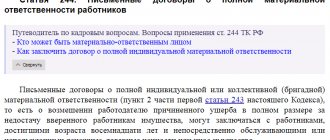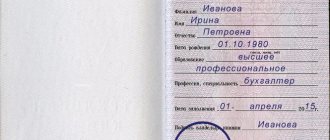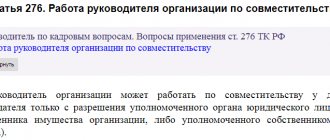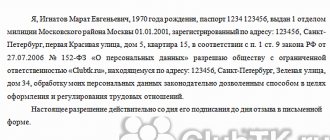Article 213 of the Labor Code of the Russian Federation: medical examinations. Theory of everything
This page presents Article 213 of the Labor Code of the Russian Federation in the latest edition.
Workers engaged in work with harmful and (or) dangerous working conditions (including underground work), as well as in work related to traffic, undergo mandatory preliminary (upon entry to work) and periodic (for persons under the age of 21 years old - annual) medical examinations to determine the suitability of these workers to perform the assigned work and prevent occupational diseases. In accordance with medical recommendations, these employees undergo extraordinary medical examinations.
Employees of food industry organizations, public catering and trade, water supply facilities, medical organizations and child care institutions, as well as some other employers undergo the specified medical examinations in order to protect public health and prevent the occurrence and spread of diseases.
This Code, other federal laws and other regulatory legal acts of the Russian Federation may establish mandatory medical examinations for certain categories of workers at the beginning of the working day (shift), as well as during and (or) at the end of the working day (shift). The time spent undergoing these medical examinations is included in working hours.
Harmful and (or) dangerous production factors and work, during the performance of which mandatory preliminary and periodic medical examinations are carried out, the procedure for conducting such examinations is determined by the federal executive body authorized by the Government of the Russian Federation.
Harmful and/or dangerous production factors, as well as the procedure for conducting preliminary and periodic medical examinations, are reflected in order 302n.
If necessary, by decision of local authorities, individual employers may introduce additional conditions and indications for mandatory medical examinations.
Employees carrying out certain types of activities, including those associated with sources of increased danger (with the influence of harmful substances and adverse production factors), as well as those working in conditions of increased danger, undergo a mandatory psychiatric examination at least once every five years in the manner established by the authorized The Government of the Russian Federation is a federal executive body.
The procedure for undergoing mandatory psychiatric examination is established by Resolution 695.
The medical examinations and psychiatric examinations provided for in this article are carried out at the expense of the employer.
Below you can leave comments on Article 213 of the Labor Code of the Russian Federation, as well as see comments from other site participants
compulsory medical examinations as basic conditions for certain types of employment
.
Based on it, they mainly include specialists working in harmful and dangerous working conditions. What does this mean?
- In the organization where the employee works, there are harmful or dangerous factors that are included in the special list of Order of the Ministry of Health and Social Development of Russia No. 302n. These factors can be both biological and technical (including chemical). A special case is the physical factor.
- The labor process is dangerous and is included in the corresponding list in Order No. 302n. For example, this includes work at height and work related to the installation of electrical installations.
In addition, a special category includes undergoing a medical examination by persons who work in the field of passenger and transport transportation. A detailed list of professions was approved by the Government of the Russian Federation in Resolution No. 16. These include persons who themselves drive vehicles, as well as those involved in traffic control (dispatchers or duty officers).
The third group includes employees:
- enterprises operating in the field of trade, public catering and food industry;
- children's educational institutions;
- medical organizations;
- enterprises engaged in water supply services.
Detailed information on regulations
In accordance with regulations, all specialists listed above must undergo two types of medical examinations
:
- Preliminary
. It must be completed before an employment contract is concluded. The main purpose of this check is to identify illnesses in the applicant that interfere with the performance of work duties. The secondary goal is the identification of diseases at an early stage, their subsequent treatment, and prevention. - Periodic
. From the name you can understand that they are carried out a certain number of times over a set period of time. The main purpose of this examination is to examine the employee’s health status, as well as to prevent and identify at an early stage an occupational disease that can lead to accidents. More information about the timing and periods of inspections can be found in Appendices No. 1, 2 of Order No. 302n.
There are also a number of additional medical examinations
:
- Extraordinary
. In accordance with the Labor Code of the Russian Federation, this examination is carried out if there are medical recommendations reflected in the conclusion of a certain specialist (clause 13, Appendix No. 3 of Order No. 302n). - Pre-trip, pre-shift, post-shift, post-trip
. As you can tell from the name, these inspections are carried out before and after a shift/flight. The need to pass them is reflected in legislative acts. As an example, drivers are required to undergo a medical examination before and after departure. This circumstance regulates.
Article 213 of the Labor Code of the Russian Federation specifies a number of requirements
to monitor the mental state of specialists whose place of work is associated with harmful and dangerous substances or poor production factors. Such workers are required to be regularly examined by a psychiatrist.
The full list of works that are required to undergo periodic inspection is displayed in Decree of the Government of the Russian Federation No. 377 of 1993. These types of work, as a rule, are inextricably linked with the action of chemical and physiological factors (such as high and low constant temperatures, physical activity).
The main purpose of this examination is to identify the specialist’s condition and determine his ability to continue to properly perform his duties (while maintaining concentration, attention and mental activity).
Passage order
- Persons who apply for a position related to the regulation of train traffic (Order of the Ministry of Railways of the Russian Federation No. 6C).
- Specialists who dispose of chemical weapons (Order of the Ministry of Health of the Russian Federation No. 101 of 2000).
Other employees who are required to undergo a medical examination must adhere to the standards shown in Appendix No. 3 of Order No. 302n.
- The employer issues a referral to the applicant to undergo a medical examination (the form of the form is not regulated and may vary depending on the clinic where the examination will take place).
- After the examination is carried out, a medical report is drawn up based on its results in two units. One of them will remain in the employee’s medical card, and the second will be given to him.
- After receiving the conclusion, it is provided to the employer, who will subsequently make a decision on whether to hire or refuse.
Who pays
The amount of the fine imposed will be:
- For an enterprise: 100,000 – 130,000 rubles.
- For officials and individual entrepreneurs: 15,000 – 25,000 rubles.
In case of repeated violation of this obligation, fines may double and administrative liability
(ban on conducting activities for a certain period).
In addition, for violation of labor safety rules, which resulted in the death of an employee, criminal liability may be imposed in accordance with Article 143 of the Criminal Code of the Russian Federation.
Medical examination is an important part
relationship between employer and specialist. It also allows you to find out your health status and ensure your safety, even by prohibiting you from performing certain duties.
More information about periodic medical examinations is presented in the video.
Article 213 of the Labor Code of the Russian Federation establishes medical examinations as necessary conditions for the work of certain categories of employees. What types of medical examinations are there, how they are paid for, what awaits the employee and employer for failing to undergo an examination, read the article.
Categories of employees required to undergo medical examinations in accordance with the Labor Code of the Russian Federation
Some employees, due to the specific nature of their job duties, must undergo medical examinations. These include, first of all, those listed in Art. 213 Labor Code of the Russian Federation workers.
Firstly, these include persons working in harmful and/or dangerous conditions, which means:
- At work there are harmful or dangerous factors included in a special list, which is contained in Appendix No. 1 to the order of the Ministry of Health of the Russian Federation “On approval of lists of harmful and (or) dangerous factors ...” dated April 12, 2011 No. 302n (hereinafter referred to as order No. 302n). These can be biological, physical, chemical factors or labor process factors (for example, physical activity).
- The work itself is dangerous by its nature and is included in the corresponding list (Appendix No. 2 to Order No. 302n). For example, this includes work at heights and work at explosive sites.
Secondly, persons working in the field of transport are subject to mandatory medical examinations. The list of such employees was approved by the Government of the Russian Federation (Resolution No. 16 dated January 19, 2008). This includes both persons directly managing transport and other workers whose work is related to the movement of transport: dispatchers, operators, attendants, etc.
Thirdly, employees are required to undergo medical examinations:
- enterprises, trade, catering, food industry;
- children's institutions;
- medical organizations;
- waterworks.
Purposes of medical examinations at the enterprise. Types of medical examinations
- Preliminary. They are carried out before the conclusion of an employment contract. The main goal of these is to identify whether the employee has diseases that prevent him from performing a particular job, and the secondary goal is the early detection of diseases, as well as their prevention.
- Periodic.
As their name suggests, they are held once during a certain period of work. Their goals are to monitor the employee’s health status, prevent and timely identify occupational diseases, and prevent accidents. The specific periods for their passage are determined by Appendices No. 1 and 2 of Order No. 302n.
In addition, there are other types of medical examinations:
- Extraordinary. such medical examinations
in cases where there are appropriate medical recommendations recorded in the medical report (clause 13 of Appendix No. 3 to Order No. 302n). - Pre-trip, pre-shift, post-trip and post-shift. As the name suggests, they are held before or after a flight/shift. The obligation to pass them is fixed in various legislative acts. Thus, drivers are required to undergo pre- and post-trip inspections on the basis of Part 1 of Art. 23 of the Law “On Road Traffic Safety” dated December 10, 1995 No. 196-FZ.
Regular psychiatric examination of some employees
In Part 7 of Art. 213 of the Labor Code of the Russian Federation establishes special requirements for monitoring the health status of workers whose activities are associated with increased danger and/or harmful substances and poor production factors. Such employees must undergo regular examinations by a psychiatrist.
The types of work that require such examinations are determined by the Decree of the Government of the Russian Federation “On the implementation of the Law “On Psychiatric Care...”” dated April 28, 1993 No. 377.
In particular, these include work involving exposure to harmful chemicals (for example, production and other processes associated with the release of amino acids) and physical factors (for example, work in conditions of constantly high/low air temperatures, physical overload).
The purpose of such events is to determine the suitability of employees to perform their duties, which require sobriety of mind, attention and concentration. The examination is carried out before entering work (along with a preliminary medical examination, which, as a rule, is also mandatory for such employees), and then at least once every 5 years.
Procedure for undergoing medical examinations
- applying for work related to the movement of trains (see “Regulations on the procedure for conducting preliminary medical examinations ...”, approved by order of the Ministry of Railways of the Russian Federation dated March 29, 1999 No. 6C);
Source: https://msutt.ru/statya-213-tk-rf-medicinskie-osmotry-teoriya-vsego/
NTVP "Kedr - Consultant"
LLC "NTVP "Kedr - Consultant" » Services » Legal consultations » Labor disputes » On re-examination (medical examination) of an employee at the expense of the Employer
The employee underwent a periodic medical examination, paid for by the Employer, and one of the tests turned out to be negative.
Questions:
Who should pay for the re-analysis (examination), the Employer or the Employee?
Lawyer's answer
In accordance with Part 1 of Art. 219 of the Labor Code of the Russian Federation, each employee has the right to an extraordinary medical examination in accordance with medical recommendations while retaining his place of work (position) and average earnings during the said medical examination.
Article 214 of the Labor Code of the Russian Federation establishes the obligation of an employee to undergo mandatory preliminary (upon employment) and periodic (during employment) medical examinations, other mandatory medical examinations, as well as undergo extraordinary medical examinations at the direction of the employer in cases provided for by labor legislation and other federal laws. laws.
According to Article 213 of the Labor Code of the Russian Federation, workers engaged in work with harmful and (or) dangerous working conditions (including underground work), as well as in work related to traffic, undergo mandatory preliminary (upon entry to work) and periodic (for persons under the age of 21 - annual) medical examinations to determine the suitability of these workers to perform the assigned work and prevent occupational diseases. In accordance with medical recommendations, these employees undergo extraordinary medical examinations.
Part 7 of Art. 213 of the Labor Code of the Russian Federation stipulates that those provided for in Art. 213 of the Labor Code of the Russian Federation, medical examinations and psychiatric examinations are carried out at the expense of the employer.
Article 185 of the Labor Code of the Russian Federation defines guarantees for employees sent for a medical examination, which states that during the period of undergoing a medical examination, employees who are required to undergo such an examination in accordance with the Labor Code of the Russian Federation are retained the average earnings at their place of work.
Part 4 of Art. 213 of the Labor Code of the Russian Federation determines that harmful and (or) dangerous production factors and work, during the performance of which mandatory preliminary and periodic medical examinations are carried out, the procedure for conducting such examinations is determined by the federal executive body authorized by the Government of the Russian Federation.
Pursuant to Art. 213 of the Labor Code of the Russian Federation, Order of the Ministry of Health and Social Development of Russia dated April 12, 2011 N 302n was issued “On approval of lists of harmful and (or) hazardous production factors and work, during the performance of which mandatory preliminary and periodic medical examinations (examinations) are carried out, and the procedure for conducting mandatory preliminary and periodic medical examinations (examinations) of workers engaged in heavy work and work with harmful and (or) dangerous working conditions” (hereinafter referred to as Order No. 302n).
Paragraph 3 of Appendix No. 3 to Order No. 302n establishes the goals of periodic medical examinations.
Paragraph 40 of Appendix No. 3 to Order No. 302n establishes that if there is a suspicion that an employee has an occupational disease during a periodic examination, the medical organization issues the employee a referral to an occupational pathology center or a specialized medical organization that has the right to conduct an examination of the connection between the disease and the profession, as well as draws up and sends, in the prescribed manner, a notice of the establishment of a preliminary diagnosis of an occupational disease to the territorial body of the federal executive authorities authorized to exercise state control and supervision in the field of ensuring sanitary and epidemiological well-being, and clause 41 of Appendix No. 3 to Order No. 302n establishes that If it is difficult to determine the professional suitability of an employee due to his illness and for the purpose of examining professional suitability, the medical organization sends the employee to an occupational pathology center or a specialized medical organization that has the right to conduct an examination of the connection between the disease and the profession and professional suitability in accordance with the current legislation of the Russian Federation. Federation.
Thus, the referral of some employees for additional examination follows from the given regulatory material and is part of the process of periodic medical examination of employees, which was organized by the employer, and is considered completed in accordance with paragraphs 30 and 31 of Appendix No. 3 to Order No. 302n. At the same time, the employer, in accordance with clause 24 of Appendix 3 to Order No. 302n, handed over to the person sent for a periodic examination (employee) a referral for a periodic medical examination, in connection with which the employer is obliged to comply with Art. 219 of the Labor Code of the Russian Federation - pay the average salary for the period of passing the specified medical examination.
{Question: ...The LLC organized a periodic examination of employees in accordance with Order of the Ministry of Health and Social Development of Russia dated April 12, 2011 N 302n, as a result of which some employees were given a referral for additional examination. Should an employer pay for days when an employee underwent additional examination and was absent from work if he does not have sick leave? What documents should the employee submit to confirm completion of the additional examination? (Expert consultation, Rostrud, 2015) {ConsultantPlus}}
Based on the above, a re-analysis (additional examination) of an employee is part of the periodic medical examination process; this analysis must be paid for by the employer.
The explanation was given by Igor Borisovich Makshakov, legal consultant of LLC NTVP Kedr-Consultant, October 2018.
When preparing the answer, SPS ConsultantPlus was used.
This clarification is not official and does not entail legal consequences; it is provided in accordance with the Regulations of the CONSULTATION LINE ().
Article 213 of the Labor Code of the Russian Federation on medical examinations
Article 213 of the Labor Code of the Russian Federation establishes medical examinations as necessary conditions for the work of certain categories of employees. What types of medical examinations are there, how they are paid for, what awaits the employee and employer for failing to undergo an examination, read the article.
Some employees, due to the specific nature of their job duties, must undergo medical examinations. These include, first of all, those listed in Art. 213 Labor Code of the Russian Federation workers.
Firstly, these include persons working in harmful and/or dangerous conditions, which means:
Yandex.Zen
- At work there are harmful or dangerous factors included in a special list, which is contained in Appendix No. 1 to the order of the Ministry of Health of the Russian Federation “On approval of lists of harmful and (or) dangerous factors ...” dated April 12, 2011 No. 302n (hereinafter referred to as order No. 302n). These can be biological, physical, chemical factors or labor process factors (for example, physical activity).
- The work itself is dangerous by its nature and is included in the corresponding list (Appendix No. 2 to Order No. 302n). For example, this includes work at heights and work at explosive sites.
Secondly, persons working in the field of transport are subject to mandatory medical examinations. The list of such employees was approved by the Government of the Russian Federation (Resolution No. 16 dated January 19, 2008). This includes both persons directly managing transport and other workers whose work is related to the movement of transport: dispatchers, operators, attendants, etc.
Thirdly, employees are required to undergo medical examinations:
- enterprises, trade, catering, food industry;
- children's institutions;
- medical organizations;
- waterworks.
Purposes of medical examinations at the enterprise. Types of medical examinations
All of the above categories of workers undergo at least 2 types of medical examinations:
- Preliminary. They are carried out before the conclusion of an employment contract. The main goal of these is to identify whether the employee has diseases that prevent him from performing a particular job, and the secondary goal is the early detection of diseases, as well as their prevention.
- Periodic. As their name suggests, they are held once during a certain period of work. Their goals are to monitor the employee’s health status, prevent and timely identify occupational diseases, and prevent accidents. The specific periods for their passage are determined by Appendices No. 1 and 2 of Order No. 302n.
In addition, there are other types of medical examinations:
- Extraordinary. such medical examinations in cases where there are appropriate medical recommendations recorded in the medical report (clause 13 of Appendix No. 3 to Order No. 302n).
- Pre-trip, pre-shift, post-trip and post-shift. As the name suggests, they are held before or after a flight/shift. The obligation to pass them is fixed in various legislative acts. Thus, drivers are required to undergo pre- and post-trip inspections on the basis of Part 1 of Art. 23 of the Law “On Road Traffic Safety” dated December 10, 1995 No. 196-FZ.
Regular psychiatric examination of some employees
In Part 7 of Art. 213 of the Labor Code of the Russian Federation establishes special requirements for monitoring the health status of workers whose activities are associated with increased danger and/or harmful substances and poor production factors. Such employees must undergo regular examinations by a psychiatrist.
The types of work that require such examinations are determined by the Decree of the Government of the Russian Federation “On the implementation of the Law “On Psychiatric Care...”” dated April 28, 1993 No. 377.
In particular, these include work involving exposure to harmful chemicals (for example, production and other processes associated with the release of amino acids) and physical factors (for example, work in conditions of constantly high/low air temperatures, physical overload).
The purpose of such events is to determine the suitability of employees to perform their duties, which require sobriety of mind, attention and concentration. The examination is carried out before entering work (along with a preliminary medical examination, which, as a rule, is also mandatory for such employees), and then at least once every 5 years.
Procedure for undergoing medical examinations
For some categories of workers, special departmental regulations have been adopted regulating the procedure for them to undergo medical examinations. These include, for example:
- applying for work related to the movement of trains (see “Regulations on the procedure for conducting preliminary medical examinations ...”, approved by order of the Ministry of Railways of the Russian Federation dated March 29, 1999 No. 6C);
- citizens carrying out work on the destruction of chemical weapons (see “The procedure for conducting preliminary and periodic medical examinations...”, approved by order of the Ministry of Health of the Russian Federation dated March 21, 2000 No. 101).
In relation to other employees who must undergo medical examinations, you should follow the procedure for conducting medical examinations specified in Appendix No. 3 to Order No. 302n (hereinafter referred to as the Procedure for Conducting Medical Examinations).
To conduct a preliminary medical examination, the employer must issue the applicant a referral for a medical examination. The form for this direction has not been approved.
The employer can use the form of the medical organization with which the contract for conducting examinations is concluded, or draw up the form independently.
It is only important that it contains all the necessary information specified in clause 8 of the Procedure for conducting medical examinations.
Periodic examinations are also carried out on the basis of a referral, however, the employer must draw up in advance lists of employees subject to examinations and coordinate with the medical institution a plan for their implementation.
Based on the results of the examinations, a medical report is drawn up in 2 copies. One copy remains in the medical record, and the other is given to the employee or applicant. Based on this conclusion, the employer is obliged to make a decision on admission or refusal to work.
Important! Refusal to hire on the basis that an employee has medical contraindications for the job is justified. The Plenum of the Supreme Court of the Russian Federation indicated that the state of health relates to the business qualities of an employee (paragraph 5, 6, paragraph 10 of Resolution No. 2 of March 17, 2004).
Medical examinations under Art. 213 Labor Code of the Russian Federation: who makes the payment
In accordance with Part 8 of Art. 213 of the Labor Code, medical examinations of employees , as well as the examinations provided for in this article, must be paid for by the employer.
Companies often enter into contracts with medical institutions for these purposes. Medical examinations in such cases are paid directly by the employer in accordance with the terms of the contract.
If there is no such agreement, then it is unlawful to require employees (applicants) to undergo examinations by doctors at their own expense.
At the same time, in the case of applicants, it is permissible to establish an agreement on their undergoing medical examinations at their own expense with subsequent compensation from the company.
IMPORTANT! The law does not make employer payment for a medical examination dependent on the results of this event. Thus, an examination may reveal the applicant’s unsuitability for work, and an employment contract will not be concluded with him. But this does not relieve the employer from the obligation to pay for the inspection.
In order to receive money, an employee needs to write an application addressed to the head of the company in any form. Documents confirming payment for medical services are attached to the application. However, the law does not establish a specific deadline for payment of money towards the cost of a medical examination. As a rule, payments are made on the next day of salary transfer.
IMPORTANT! Employers can reimburse the costs of mandatory medical examinations of employees whose work involves harmful or dangerous factors by reducing insurance contributions to the Social Insurance Fund (see “Financial Security Rules...”, approved by order of the Ministry of Labor of the Russian Federation dated December 10, 2012 No. 580n).
If a company refuses to pay an employee money for a medical examination, he has the right to recover it in court.
What happens if an employee does not pass the medical examination?
If an employee for whom a medical examination or certification is required does not pass it, then the employer does not have the right to allow him to work. Such an employee must be suspended from work (Article 76 of the Labor Code of the Russian Federation). Suspension is carried out until its cause is eliminated, i.e. until the employee undergoes a medical examination/examination.
In this case, the issue of payment for the period of suspension from performance of labor duties is resolved as follows:
- if the medical examination is not completed through no fault of the employee, then this period must be paid to him as a simple period (Part 3 of Article 76 of the Labor Code of the Russian Federation);
- if the employee himself is to blame for failing to undergo a medical examination, he is not paid wages during this time.
If an employee refuses or evades a medical examination without good reason, this can be regarded as a disciplinary offense.
Failure by the employer to comply with the requirements of paragraph. 11 hours 2 tbsp. 212 Labor Code of the Russian Federation
The employer must ensure labor protection and safe conditions. This includes, among other things, the obligation to organize and pay for mandatory medical examinations and examinations (paragraph 11, part 2, article 212 of the Labor Code of the Russian Federation).
In case of failure by the employer to fulfill this obligation, which can be expressed either in the admission of a person who has not passed the inspection or examination to work, or in the admission to work of a person who has contraindications, may result in the imposition of a fine under Part 3 of Art. 5.27.1 Code of Administrative Offenses of the Russian Federation. The fine amounts are as follows:
- for organizations - from 100,000 to 130,000 rubles;
- for officials and individual entrepreneurs - from 15,000 to 25,000 rubles.
In case of a repeated violation, liability increases - Part 5 of this article of the Code of Administrative Offenses of the Russian Federation contains increased fines, as well as more severe punishments, for example, in the form of administrative suspension of activities.
Criminal liability is also established for violation of labor safety rules. Thus, it is possible to hold a person accountable under Art. 143 of the Criminal Code of the Russian Federation, if he allowed to work a person who did not pass a medical examination or had contraindications to work, as a result of which consequences occurred in the form of serious harm to health or death.
***
According to the Labor Code, medical examinations must always be organized and paid for by the employer. Legal liability is established for failure to fulfill this obligation. But an employee who has not undergone a medical examination due to his own fault will also experience negative consequences: he will not be paid for the time he is suspended from work.
Source
Source: https://IDeiforbiz.ru/statia-213-tk-rf-po-provedeniu-medicinskih-osmotrov.html
Categories of employees required to undergo medical examinations in accordance with the Labor Code of the Russian Federation
Some employees, due to the specific nature of their job duties, must undergo medical examinations. These include, first of all, those listed in Art.
213 Labor Code of the Russian Federation workers.
Firstly, these include persons working in harmful and/or dangerous conditions, which means:
- At work there are harmful or dangerous factors included in a special list, which is contained in Appendix No. 1 to the order of the Ministry of Health of the Russian Federation “On approval of lists of harmful and (or) dangerous factors ...” dated April 12, 2011 No. 302n (hereinafter referred to as order No. 302n). These can be biological, physical, chemical factors or labor process factors (for example, physical activity).
- The work itself is dangerous by its nature and is included in the corresponding list (Appendix No. 2 to Order No. 302n). For example, this includes work at heights and work at explosive sites.
Secondly, persons working in the field of transport are subject to mandatory medical examinations. The list of such employees was approved by the Government of the Russian Federation (Resolution No. 16 dated January 19, 2008). This includes both persons directly managing transport and other workers whose work is related to the movement of transport: dispatchers, operators, attendants, etc.
Thirdly, employees are required to undergo medical examinations:
- enterprises, trade, catering, food industry;
- children's institutions;
- medical organizations;
- waterworks.









